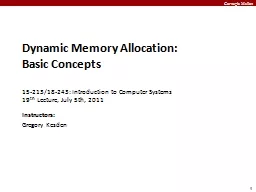PPT-A few minutes will be allocated at the end of this presenta
Author : min-jolicoeur | Published Date : 2017-04-09
However if you would like to put a question to me before then please do so Rethinking Education Embracing Choice and Diversity Hong Kong 1013 October 2014 Dr Paula
Presentation Embed Code
Download Presentation
Download Presentation The PPT/PDF document "A few minutes will be allocated at the e..." is the property of its rightful owner. Permission is granted to download and print the materials on this website for personal, non-commercial use only, and to display it on your personal computer provided you do not modify the materials and that you retain all copyright notices contained in the materials. By downloading content from our website, you accept the terms of this agreement.
A few minutes will be allocated at the end of this presenta: Transcript
Download Rules Of Document
"A few minutes will be allocated at the end of this presenta"The content belongs to its owner. You may download and print it for personal use, without modification, and keep all copyright notices. By downloading, you agree to these terms.
Related Documents














